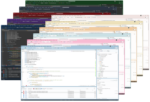C++14 standard gains approval
The next official version of C++ is on its way to publication after the C++14 standard ballot was unanimously approved.
According to a blog post from Visual C++ language architect and ISO C++ committee chairman Herb Sutter, the C++14 document will now be sent to the ISO/IEC for official approval. Some of the most significant additions in C++ 14 will include function return type deduction, generic lambdas and lambda capture expressions, variable templates, and binary laterals.
Commenting on the approval, C++ creator Bjarne Stroustrup wrote, “C++14 was delivered on schedule and implementations are already shipping by major suppliers. This is exceptional! It is a boon to people wanting to use C++ as a modern language.”
A more detailed look at the features and additions coming in C++14 is available at the newly approved Draft International Standard ballot.
Microsoft announces end-of-life for .NET 4.0-4.5.1
The end is near for .NET 4.0.
Microsoft has updated its .NET Framework Support Lifecycle Policy to reflect that after Jan. 12, 2016, all technical support for .NET 4.0 through 4.5.1 will be discontinued, at which point developers and users must revert to 3.5 or upgrade to 4.5.2. Those versions of .NET also have a clock on them though, as Microsoft has set deadlines of Jan. 14, 2020 for .NET 3.5 SP 1 and Jan. 9, 2018 for 4.5.2.
Those deadlines coincide with the end-of-life schedule for Windows 7 and Windows Server 2008 R2.
Microsoft announces Bing Developer Assistant for Visual Studio
Microsoft has announced the availability of the Bing Developer Assistant for Visual Studio, an extension that brings together the Visual Studio Sample Browser and Bing Code Search extensions to enable developers to find and reuse code snippets and sample projects.
(Related: More recent developer improvements to Bing Search)
Bing Developer Assistant searches code snippets throughout MSDN, StackOverflow, Dot Net Perls and C# 411 from within the Visual Studio IDE. Other new features for the Visual Studio extension include:
• Visual Studio IntelliSense integration: Relevant code snippets related to the current API will be automatically displayed in the IntelliSense window, powered by Bing Code Search.
• Sample Browser provides one-click access to sample code: By entering programming needs into the Visual Studio toolbar, a developer receives a selection of code snippets and code sample projects.
• Offline search: Developers can search for code samples among local or downloaded sample projects even when disconnected from the Internet, and custom configuration options to index local sample folders.
The Bing Developer Assistant for Visual Studio is available as a free download for Visual Studio 2013/Visual Studio 2012. More information is available on the Bing Dev Center blog post.
Ruby on Rails 4.0.9 and 4.1.5 released
Versions 4.0.9 and 4.1.5 of the Ruby on Rails programming language have been released, primarily devoted to security fixes.
Rails core team member Rafael Franca announced the release in a blog post detailing the security issue, which involves a vulnerability in the create_with method in Active Record that could allow attackers to set arbitrary attributes on models.
The commits for Ruby on Rails 4.0.9 and 4.1.5 are available on GitHub.
Google office hours for Udacity MOOCs
Google announced four new Udacity online courses to help developers learn Android, Web, and UX design, and cloud technology at its developer conference—Google I/O—in June. Now the company wants to help students with those courses.
“Over the next two weeks, we’ll be hosting on-air office hours to help out students who are working through some of these classes,” wrote Peter Lubbers, program manager of Google’s Scalable Developer Programs, on the company blog.
Students will be able to ask questions, and Google experts will answer them live. Featured classes include “Web Performance Optimization—Critical Rendering Path,” “Android Fundamentals” and “Building Scalable Apps with Google App Engine.”
“Please join us if you are taking the class, or just interested in the answers,” Lubbers wrote.
Algorithmia raises $2.4 million in seed funding and launches app store for algorithms
Algorithmia wants developers to be able to easily find, build, test, share and implement algorithms easily. The company just announced $2.4 million in seed funding led by Madrona Venture Group.
According to Algorithmia, the problem with algorithms is that they are trapped on paper and rarely in a usable state. As a result, Algorithmia has developed a marketplace for algorithms.
“We are building a community around algorithm development and implementation where state-of-the-art algorithms are always live and accessible to anyone,” said Diego Oppenheimer, founder and CEO of Algorithmia. “Early response has shown that exposing algorithms and offering them in an easy-to-use format is not only a timesaver for companies, but is an incredibly valuable resource in building the critical applications and thinking in new ways about product development.”
Algorithmia is currently in beta and is expected to launch by the end of the year.




